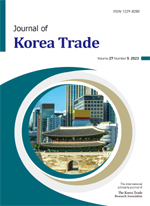학술논문
Revisiting the Role of Imported Inputs in Asian Economies
이용수 6
- 영문명
- Revisiting the Role of Imported Inputs in Asian Economies
- 발행기관
- 한국무역학회
- 저자명
- 이우철
- 간행물 정보
- 『Journal of Korea Trade (JKT)』Vol.27 No.5, 113~136쪽, 전체 24쪽
- 주제분류
- 경제경영 > 무역학
- 파일형태
- 발행일자
- 2023.10.31
5,680원
구매일시로부터 72시간 이내에 다운로드 가능합니다.
이 학술논문 정보는 (주)교보문고와 각 발행기관 사이에 저작물 이용 계약이 체결된 것으로, 교보문고를 통해 제공되고 있습니다.

국문 초록
영문 초록
Purpose - Global production chains and their impacts on economic growth have drawn extensive attention from researchers. Close relationships among global production chains, export and economic growth have been illuminated, as evidenced by the fast and stable economic growth of East Asian economies. These economies perform various roles within global production chains using offshoring, in which the impact of import on domestic gross output is as strong as that of export. The impact of import on economic growth would depend on whether imported inputs substitute or complement domestic inputs production, which is likely to vary according to individual countries' functions within global production chains. The economic growth of concerned countries would also be diverse. However, little attention has been paid to the impact brought by imports compared to its significance.
Design/methodology - The principal methodology used in this paper is structural decomposition analysis (SDA), widely chosen to elucidate the impact of various factors on domestic gross output using input-output tables. This paper extracts trade data of six Asian economies from the World Input-Output Database (WIOD) 2016 release that covers 43 countries for the period 2000-2014. The extracted data is then categorised into 37 sectors. First, this paper calculates the Feenstra-Hanson Offshoring Index (OSI) of each country. It then applies SDA to measure the changes in each economy's gross output, export, import input coefficients, and domestic input coefficients. Finally, after taking the first difference from pooled time-series data, it estimates the correlations between imported input coefficients and OSI using the ordinary least square (OLS) method.
Findings - The main findings of this paper can be summarised as follows. Firstly, all six countries have increasingly engaged in global production chains, as evidenced by the growing size of OSI. Secondly, there are negative correlations in five countries except Japan, with sectoral differences. Thirdly, changes in import input coefficients are not negative in all six countries, indicating that offshoring does not necessarily substitute for domestic inputs production but does complement it and, therefore, fosters their economic growth. This is observed in China, Indonesia, Korea and Taiwan. Offshoring has led to an increase in the use of imported inputs, which has, in turn, stimulated domestic inputs production in these countries.
Originality/value - While existing studies focus on the role of export in evaluating the impact of participating global production chains, this paper explicitly examines the unexplored impact of import on domestic gross output by considering both the substitution and the complementary effect, using the WIOD. The findings of this paper suggest that Asian economies have achieved fast and stable economic growth not only through successful export management but also through effective import management within global production chains. This paper recommends that the Korean government and enterprises carefully choose offshoring strategies to minimise disruption to domestic production chains or foster them.
목차
1. Introduction
2. Structural Decomposition Analysis: A Literature Review
3. Data Set, Structural Decomposition Method and Offshoring Index
4. Offshoring, Changes in Input Coefficients and Domestic Gross Output in the Asian Economies
5. Concluding Remarks
References
키워드
해당간행물 수록 논문
- Journal of Korea Trade (JKT) Vol.27 No.5 목차
- FDI and the Evolution of Directed Technological Progress Bias: New Evidence from Korean Outward Investment
- Revisiting the Role of Imported Inputs in Asian Economies
- Impact of Logistics 4.0 Technology Adoption on Logistics Performance: The Mediating Effect of Logistics Innovation Capability and the Mediated Moderation Effect of Firm Size
- The Effect of Economic and Infrastructure Factors on the Formation of Electric Vehicle Supply Chain and Optimal Location Selection: Korea-US FDI
- Legal Implications of U.S. CVD on Tires and Undervalued Currency in the WTO's SCM
- The Effect of Trade Agreements on Korea’s Bilateral Trade Volume: Mitigating the Impact of Economic Uncertainty in Trading Countries
- A Study on Co-movements and Information Spillover Effects Between the International Commodity Futures Markets and the South Korean Stock Markets: Comparison of the COVID-19 and 2008 Financial Crises
- Containing China versus Choking the Asian Economy
- Localized Knowledge Spillovers and Organizational Capabilities: Evidence from the Canadian Manufacturing Sector
참고문헌
관련논문
최근 이용한 논문
교보eBook 첫 방문을 환영 합니다!

신규가입 혜택 지급이 완료 되었습니다.
바로 사용 가능한 교보e캐시 1,000원 (유효기간 7일)
지금 바로 교보eBook의 다양한 콘텐츠를 이용해 보세요!





